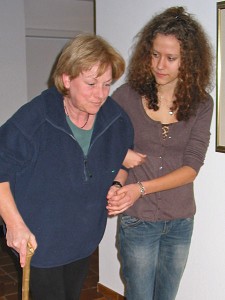Tag Archives: carers
What's the simplest way to get a non-technical person online?
Lynda wants to get her sister-in-law online, but she’s over 70, has no experience of modern technology, and lives on her own a long way away
My sister-in-law would like to be able to watch her grandchild grow up. She is over 70 and has no experience of modern technology, and lives on her own a long way from us. There is no friendly IT person nearby.
We know this is going to be difficult, but what would be the simplest forms of technology to buy for her to use? We were thinking of buying two smartphones, so we could help her as best we could by having the same phone. I also thought we could buy her a tablet so we could Skype and she could see photos in large format. We use a laptop and I have an old iPhone. Lynda
Identifying and supporting informal carers
Carers need to be encouraged to see themselves as carers

Image credit: Produnis
In this guest post, Dr Emma Carduff and Dr Anne Finucane, co-authors on a new paper published today in BMC Family Practice explain why it’s important to support the carers of people approaching the end of their lives.
Approx. 10% of the UK population have an unpaid caring role for a family member or friend. Many of these carers make a significant contribution to supporting people who are approaching the end of their lives. With increasing numbers of older and frailer people in the population, informal carers will play a vital role in caring for family members as health deteriorates and end of life approaches. In particular, care from informal carers, who are generally family members, is essential for those who wish to be cared for in their own home.
Carers can experience poor physical and psychosocial wellbeing, yet they remain largely unsupported by health and social services. It is essential that carers are supported both to maintain their own health and wellbeing and to care for their family member or friend. However, before they can be supported, carers need to be identified.
Suffolk: Dementia patients need better access to services
Suffolk: Dementia patients need better access to services and doctors need better resources to give advice – report
 Official launch of the Forget-Me-Not Dementia Campaign at West Suffolk Hospital. Image of the corridor before work begins.
Official launch of the Forget-Me-Not Dementia Campaign at West Suffolk Hospital. Image of the corridor before work begins.
Matt Stott Friday, April 4, 2014
12:04 PM
People living with dementia in Suffolk need better access to support services, a report has claimed, after it emerged more than 5,000 sufferers live with the condition undiagnosed.
Doctors need better resources to provide good advice to newly-diagnosed dementia patients and double their current detection rate of the disease to meet new tougher government targets, the University of East Anglia (UEA) said.






